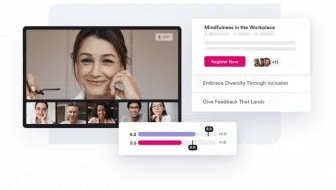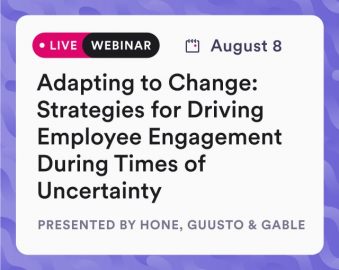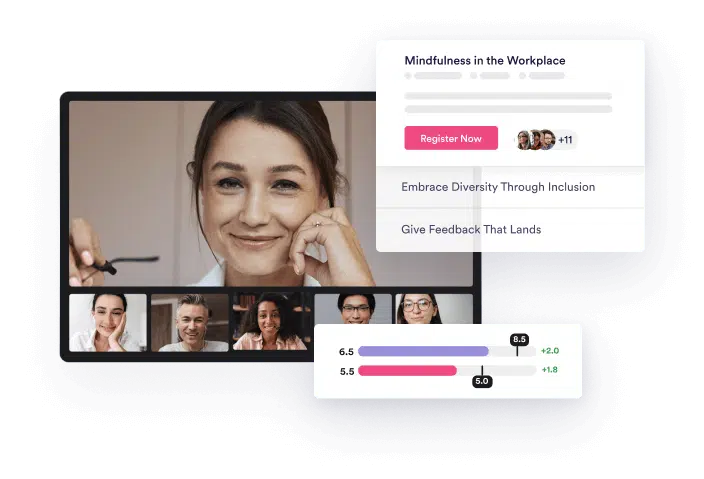Professional development is an important part of employee engagement. According to LinkedIn’s 2020 Workforce Learning Report, 94% of employees say they would stay at a company longer if it invested in their learning and development. In order to help your employees grow in a way that brings them closer to their professional goals, your managers need to ensure they know how each of their individual reports defines professional development. This can be more challenging with remote and hybrid employees, so train your managers to have ongoing career development conversations with their teams to ensure they understand an employee’s end goal and how best to help them get there. However, making sure your remote and hybrid employees and managers are on the same page is just the first step. We’ve put together a list of four best practices your managers and organization can use to invest in professional development for remote workers.
What is Professional Development?
Professional development can mean different things to different team members. To one employee it might mean learning a new skill or trying something new, while another employee might define career growth success solely on being promoted. Common ways employees might define professional development:
- Learning a new skill
- Improving existing skills
- Moving teams
- Securing a promotion
- Deepening their industry knowledge
- Working on high-visibility projects
- Taking on more responsibilities
- Finding a mentor
- Stepping into a leadership role
As a manager, you need to ensure you and your employees define professional development on the same terms, so you can better understand their end goal and how to help them get there.
Why Is It Harder to Invest in Professional Development for Remote Workers?
Professional development is a challenging aspect of managing a team whether you’re in the office, remote, or a mix of both. It requires continual coaching, active listening, thoughtful follow-up questions, and meaningful feedback. It also requires you to have extensive knowledge of your team member’s professional goals, strengths, areas of improvement, and motivations. On remote teams, those conversations don’t always happen organically. You might need to be more intentional about having these kinds of conversations with your employees early on, to help you better understand their goals and how you can help them succeed. Remember, some employees might want you to take a hands-on approach to help guide their professional development, while others might just want feedback here and there along the way. You have to work with each employee to understand how you can best help them as a manager.
5 Tips for Remote and Hybrid Professional Development Conversations
1. Make time to talk
Talking about career development doesn’t always happen organically on a remote/hybrid team. However, your managers shouldn’t wait for their employees to bring it up: it is their responsibility to bring up the topic of professional development with their direct reports. To get started, encourage your managers to bring up professional development goals during weekly or bi-weekly 1-on-1 meetings. 1-on-1s should not solely be used to touch base on projects: managers should make the most out of these casual check-ins to talk broadly about your direct report’s career goals, give feedback, and check in on their morale. To create the space for their direct reports to think and share, here are some of the most powerful questions to teach your managers to ask in 1-on-1 meetings:
- How are you really?
- What’s going particularly well?
- What are you challenged by?
- What’s something you’re doing now you’d like to do more of?
- What’s something you’re doing now you’d like to stop doing?
- What’s something you’re not doing now that you would like to start doing?
These profession development conversations rarely, if ever, happen over email. Make sure your managers know to regularly set aside the time to discuss employees’ professional development goals, check-in on progress, and share feedback. Nor should these conversations only happen annually during performance reviews. Get your managers in the habit of touching on professional growth opportunities frequently so that your employees know your company is invested in their growth.
2. Know Your Resources
Oftentimes, employees aren’t familiar with what career growth opportunities and professional development programs are available for remote workers at your company. Your managers must be familiar with your company policies and programs so you can help direct your employees to take advantage of all their available resources and help them develop their careers. For example, if you know your organization offers an annual professional growth stipend, your managers should encourage your employee to use it to take an in-person or live online class in an area they want to learn more about. Or, if your company has well-defined career ladders or career lattices, your managers can make their direct report aware of the skills and experience needed to get a promotion or move to a new team. That can help you establish an action plan to help your employee and inspire them to keep moving forward towards their goal. As an L&D or HR lead, you’ll want to ensure you have learning opportunities and resources to show your employees you’re invested in professional development for remote workers.
3. Just Be Available Just to Chat
In addition to carving out 1-on-1 time with direct reports, encourage managers to spark conversations with a more informal tone. These conversations would take place over an office coffee run, lunch, team retreat, or happy hour, but being remote, these situations don’t organically unfold. Still, these casual run-ins are an essential part of understanding what makes an employee tick as they provide an opening for learning your team’s hopes, dreams, drivers, and fears. Prioritizing professional development for remote employees doesn’t always have to be planned — it can come from spontaneous, casual conversations in the office or via Zoom. Here are three ideas to share with your managers:
- Calls don’t have to be a big event. Invite an employee to a quick 5-10 minute catch-up call over coffee or encourage them to take your next virtual 1-on-1 as a walking meeting. Creating a more casual atmosphere can help them relax and help build a stronger manager-employee relationship.
- Leave work out of it. Make time to get to know your employees personally and catch up on life. Asking them how their weekend was or how they plan on celebrating the holidays can help build a lasting relationship.
- Give your team an opportunity to socialize. Create team Slack channels for #random conversations, giving #props to others, and greeting #new-team-members.
4. Overcommunicate
Professional development for remote workers doesn’t happen in a vacuum. Your remote and hybrid employees need to understand the role they play within your business, or they’ll run the risk of feeling isolated from the company at large. Providing context is especially important because it tells employees why they’re doing the work they are and why it matters. Remind your managers that as the leader of a remote team, they should always reiterate:
- Your team’s goals
- Other team’s goals
- The company’s mission and values
- The company roadmap
- New company-wide initiatives
When it comes to perfecting professional development for remote workers, giving employees the ability to understand where things are heading and how they fit into the company’s future is key. One of the best ways to make this happen is via efficient and effective goals. Teach your managers how to use the objective and key results (OKRs) framework to create individiual and team goals that tie to larger company initiatives and explicitly define success for your employees.
5. Invest in Online Learning
According to LinkedIn’s 2020 Workforce Learning Report, learners of all generations feel more motivated to learn in a social environment and want courses personalized to their needs. Gen Z led the pack in each area, with 67% saying they prefer social and collaborative learning, and 80% saying they prefer personalized learning based on their career goals and skills gaps. With a live online learning platform, like Hone, you can easily fulfill both of those requirements in one. Hone blends the best of expert-led small group training with a powerful behavior change platform. Your employees can learn on their own time with interactive live classes that work around their busy schedules and courses that interest them and help them get closer to their professional goals. Hone has classes on the top skills today’s employees and managers need, like:
But for many employees it can be hard to know where to start. In fact, 54% admitted they would spend more time learning if they had specific course recommendations to help them reach their career goals. At Hone, learners can choose from curated learning tracks, like Manager Essentials and Create a Culture of Belonging, to kickstart their learning journey and take the straightest path to their leadership and career goals.
6. Establish an Internal Growth Framework
Once your team reaches a certain size — let’s say 5+ people per function — you’ll need to set structure around growth opportunities. This can help formalize your professional development for remote employees and make it easier for individuals to identify and pursue career opportunities within your company. Social media management company Buffer establishes career frameworks for each function. Each ladder includes a growth path for individual contributors and managers and walks through requirements for each level, like:
- The level of ownership over project progress
- The level of ownership over project results
- The strategic involvement and planning required
- The scope of influence across teams
Once your company has set your frameworks, share them with your managers and have them forward them to their remote and hybrid employees. For example, a manager can use this career framework to identify the requirements, skills, and competencies their direct report needs for a new role, but doesn’t yet have. From there, the manager can work with their employee to identify projects that would help fulfill those requirements. When an employee has a better idea of what they need to improve to reach their dream role within the company, they can stay motivated and steadily build the skills needed to secure a promotion or career transition – with a little help from a great manager, of course! —
Employee development for remote workers should be top of mind for all companies, regardless of whether their employees are in the office a few days a week or working from home full-time. That said, having a distributed workforce means you need a scalable L&D solution that can help your employees grow from wherever they’re located. Sign up for a free demo of Hone and experience our live online leadership classes for yourself and to learn more about creating a customized learning plan for your organization. Finding a solution for professional development for remote workers has never been easier.











